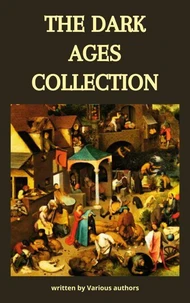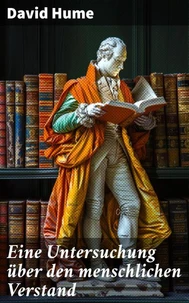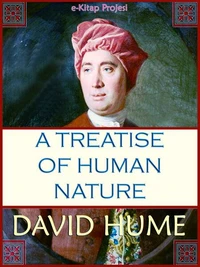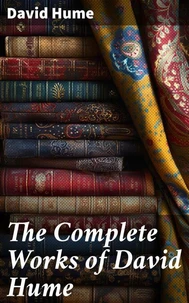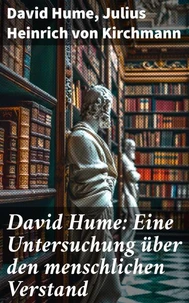David Hume: On Religion. The Natural History of Religion & Dialogues Concerning Natural Religion
Par :Formats :
Disponible dans votre compte client Decitre ou Furet du Nord dès validation de votre commande. Le format ePub est :
- Compatible avec une lecture sur My Vivlio (smartphone, tablette, ordinateur)
- Compatible avec une lecture sur liseuses Vivlio
- Pour les liseuses autres que Vivlio, vous devez utiliser le logiciel Adobe Digital Edition. Non compatible avec la lecture sur les liseuses Kindle, Remarkable et Sony
 , qui est-ce ?
, qui est-ce ?Notre partenaire de plateforme de lecture numérique où vous retrouverez l'ensemble de vos ebooks gratuitement
Pour en savoir plus sur nos ebooks, consultez notre aide en ligne ici
- Nombre de pages182
- FormatePub
- ISBN859-65--4777236-1
- EAN8596547772361
- Date de parution09/12/2023
- Protection num.Digital Watermarking
- Taille817 Ko
- Infos supplémentairesepub
- ÉditeurGOOD PRESS
Résumé
In "David Hume: On Religion, " renowned philosopher David Hume presents a critical examination of religious belief through his signature empirical lens. The book engages with major theological concepts, unsettling dogmatic doctrines while advocating for a rational approach to understanding faith. Employing a rich blend of philosophical essay, polemic, and intellectual inquiry, Hume's literary style is characterized by its clarity and eloquence, making complex ideas accessible.
Positioned within the Enlightenment tradition, this work grapples with the tension between human reason and religious belief, challenging contemporary thought and laying the groundwork for future philosophical discourse. Hume, a central figure of the Scottish Enlightenment, was profoundly influenced by the empirical methods of observation and skepticism toward established norms. His own experiences and the intellectual climate of 18th-century Scotland, marked by burgeoning ideas of personal liberty and human rationality, inspired his critical stance on religion.
Straddling the delicate interplay of faith and reason, Hume'Äôs inquiries reflect both a personal and philosophical struggle with the nature of belief. "David Hume: On Religion" is a must-read for anyone interested in philosophy, theology, or the historical context of religious thought. Hume's incisive reasoning and engaging prose invite readers to ponder their convictions while cultivating a deeper understanding of the human condition.
Positioned within the Enlightenment tradition, this work grapples with the tension between human reason and religious belief, challenging contemporary thought and laying the groundwork for future philosophical discourse. Hume, a central figure of the Scottish Enlightenment, was profoundly influenced by the empirical methods of observation and skepticism toward established norms. His own experiences and the intellectual climate of 18th-century Scotland, marked by burgeoning ideas of personal liberty and human rationality, inspired his critical stance on religion.
Straddling the delicate interplay of faith and reason, Hume'Äôs inquiries reflect both a personal and philosophical struggle with the nature of belief. "David Hume: On Religion" is a must-read for anyone interested in philosophy, theology, or the historical context of religious thought. Hume's incisive reasoning and engaging prose invite readers to ponder their convictions while cultivating a deeper understanding of the human condition.
In "David Hume: On Religion, " renowned philosopher David Hume presents a critical examination of religious belief through his signature empirical lens. The book engages with major theological concepts, unsettling dogmatic doctrines while advocating for a rational approach to understanding faith. Employing a rich blend of philosophical essay, polemic, and intellectual inquiry, Hume's literary style is characterized by its clarity and eloquence, making complex ideas accessible.
Positioned within the Enlightenment tradition, this work grapples with the tension between human reason and religious belief, challenging contemporary thought and laying the groundwork for future philosophical discourse. Hume, a central figure of the Scottish Enlightenment, was profoundly influenced by the empirical methods of observation and skepticism toward established norms. His own experiences and the intellectual climate of 18th-century Scotland, marked by burgeoning ideas of personal liberty and human rationality, inspired his critical stance on religion.
Straddling the delicate interplay of faith and reason, Hume'Äôs inquiries reflect both a personal and philosophical struggle with the nature of belief. "David Hume: On Religion" is a must-read for anyone interested in philosophy, theology, or the historical context of religious thought. Hume's incisive reasoning and engaging prose invite readers to ponder their convictions while cultivating a deeper understanding of the human condition.
Positioned within the Enlightenment tradition, this work grapples with the tension between human reason and religious belief, challenging contemporary thought and laying the groundwork for future philosophical discourse. Hume, a central figure of the Scottish Enlightenment, was profoundly influenced by the empirical methods of observation and skepticism toward established norms. His own experiences and the intellectual climate of 18th-century Scotland, marked by burgeoning ideas of personal liberty and human rationality, inspired his critical stance on religion.
Straddling the delicate interplay of faith and reason, Hume'Äôs inquiries reflect both a personal and philosophical struggle with the nature of belief. "David Hume: On Religion" is a must-read for anyone interested in philosophy, theology, or the historical context of religious thought. Hume's incisive reasoning and engaging prose invite readers to ponder their convictions while cultivating a deeper understanding of the human condition.



